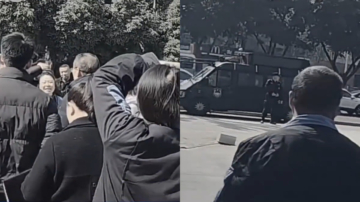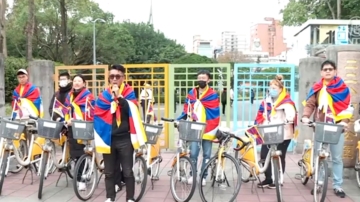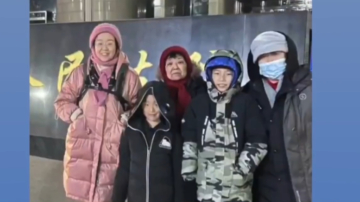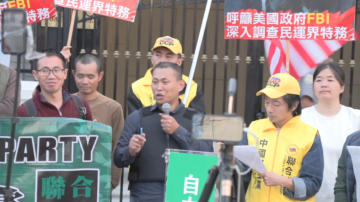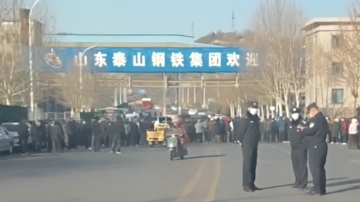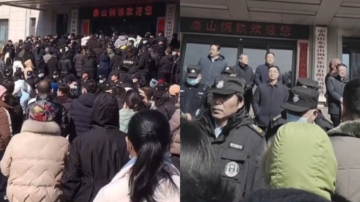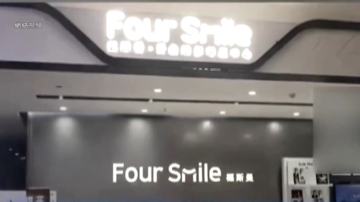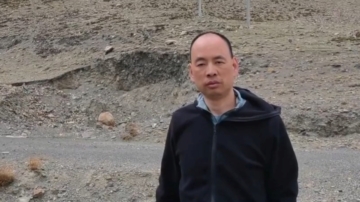【新唐人2012年11月08日訊】十八大前北京如臨大敵,當局啓動環京「護城河工程」,利用武警,安保人員,志願者等嚴查進京道口,過濾進京人員。地方官員因此也倍感壓力,成都甚至出現官員拿錢做餌,要訪民別去北京。
11月5號《新華社》報導說,周永康「通過視頻」檢查了天津、山西、內蒙古、遼寧、山東等地實施的環京「護城河工程」和現場安檢勤務情況。他還強調,要堅決防止所謂危險人員、危險物品和危險車輛進入北京。
所謂的「護城河工程」,是1996年以來,北京市與周邊6個省區市為「聯合保衛首都」,而建立地區間聯防、聯控、聯調、聯打的工作模式,和工作機制。
「六四天網」創辦人黃琦:「他所指的『危險人員』大家眾所周知,就是對現政府不是很高興的這些人吧。包括一些上訪的民眾,異議人士,維權人士,還有他們所謂的『恐怖份子』。他們的『危險』實際上就是揭露他們受到的迫害,這就是他們最大的『危險』吧。」
雖然當局實施嚴控措施,但是各地還是有許多訪民勇闖「護城河」,進京喊冤。因此周永康還要求十八大的保安實施「屬地管理,分級負責」,使得地方官員也倍感壓力。四川成都市溫江區湧泉鎮就出現了官員用錢做餌,要失地農民蔣玉瓊別去北京上訪的離奇一幕。
失地農民 蔣玉瓊兒子「他們是上個禮拜五到我們家,湧泉鎮政府和開發商,政府說開發商願意付23萬。23萬,他是開發商暫時拿了10萬,放在我們社區那裡,他說等我母親回來之後再聯繫。」
失地農民蔣玉瓊的兒子還表示,之前他母親去北京上訪過10次,然而3年來當地政府一直拖延欺騙,不給解決家裡的失地問題。但十八大前明顯感到地方官員的害怕,白天黑夜都有人監視他們。而現在這個「不見人不給錢」的做法,也讓人心存疑慮。
蔣玉瓊兒子:「但是我母親就是怕他們沒誠意,因爲現在政府都是不講信用的,我母親可能現在在北京。」
「六四天網」創辦人黃琦:「成都自從本月2日拉開了『成都訪民挺進北京大行動』之後,這個是民眾自發拉開的。當局感到很恐懼,現在是很主動的抱著錢去農民家裡面,哀求農民別去北京上訪。實際上他們並不是爲了解決問題,他們僅僅爲了保住自己的烏紗帽而已。」
成都一位訪民的丈夫郭應良也認爲,地方當局所說的「解決問題」,是爲了騙訪民回來。
訪民丈夫郭應良:「這個他們說解決問題,這是一種騙局,目地是把你騙回來,他是這個目地,騙回來過後、回來解決,回來過後就把你監控了。現在我也被監控了,昨晚上整個守我一個通宵,今天上午又有車子跟蹤。」
幾位勇闖「護城河」的訪民對地方政府現在突然表態,承諾要解決問題都表示懷疑,因爲之前的漫長上訪路已經使他們對政府失去信任。
郭應良:「群眾對共產黨的幹部太不滿意了、太反對了。我也到了很多地方,看到寫的『立黨為公,執政為民』,看到這些字,我都不曉得這些字他們怎麼想出來寫的,真正的幹部不是這樣子的。」
除了啓動環京「護城河工程」過濾進京人員,當局還把所謂「危險人物」請出了北京。據了解,北京異見人士查建國、高洪明、何德普等人都被當局人員帶走,離開北京「被旅遊」;維權人士胡佳等被送往安徽;許志永、王荔蕻、曹順利、徐永海等人也都陸續被當局人員24小時上崗監視。
採訪/易如 編輯/尚燕 後製/君卓
**************************
China』s “Fosse Project” Filters Petitioners Entering Beijing
The imminent 18th Party Congress has put Beijing under
heavy security.
The Chinese Communist Party (CCP) regime has launched
a “Fosse Project” to filter people』s entry into Beijing.
Armed forces, security personnel and officially recruited
volunteers guard main intersections to examine people.
Local CCP authorities are under pressure, too.
Chengdu』s officials have even offered money in an attempt
to discourage local petitioners from going to Beijing.
On November 5, Xinhua News Agency stated that
Zhou Yongkang, “via live video”, had inspected regional
execution of the “Fosse Project” and on-site security checks.
The areas include Tianjin, Shanxi, Inner Mongolia,
Liaoning and Shandong.
Zhou has instructed to “resolutely prevent” so-called
dangerous persons, goods and vehicles from entering Beijing, said the news report.
The alleged “Fosse Project” was set up in 1996, covering
Beijing and six neighboring regions to “jointly safeguard the Capital”.
It was designed as a regional work mechanism that jointly
Defends, controls, mobilizes and combats targets.
Huang Qi (Founder, China 6.4 Tianwang Human Rights
Info Center): "We all know its definition of so-called 『dangerous people』.
They are those whom the regime is unhappy with, including
petitioners, dissidents, right-activists, and alleged "terrorists".
To the regime, these people』s biggest “danger” is actually
their exposure of the persecutions they have suffered."
Under the authorities』 tightened control, petitioners across
China have still braved to break through the “Fosse” barrier into Beijing.
On the security work for the 18th Party Congress,
Zhou Yongkang has demanded that there be set up a
system of localizing all supervision and hierarchical control.
Zhou』s instruction has put local officials under great pressure.
In Wenjiang district of Chengdu, the town officials even
used money to coax Jiang Yuqiong, a local landless peasant, not to petition in Beijing.
Jiang Yuqiong』s son: "Last Friday, the town officials and
the property developer came to my home.
The officials said that the property developer
would like to pay RMB 230,000 yuan for the land.
They said they would prepay 100,000 yuan
but would have to see my mother back first."
Jiang Yuqiong』s son revealed that
his mother has petitioned in Beijing ten times.
However, local authorities have not really resolved
her land loss grievances over past three years.
Now, on the eve of the 18th Party Congress,
local officials have put the family under 24-hour surveillance.
They claimed that “no money would be given without seeing
Jiang Yuqiong back”, which sounds questionable.
Jiang Yuqiong』s son: "My mother just questions
their sincerity, for the government isn』t trustable.
Now, my mother may stay in Beijing.”
Huang Qi: "Chengdu petitioners voluntarily launched
a campaign of “forward into Beijing”, starting on November 2.
Local authorities have felt frightened.
They have carried money and visited petitioners』 homes,
asking them not to go to Beijing.
Of course they didn』t go resolving problems, it was just in
an attempt to keep their official positions secure."
Guo Yingliang, husband of a petitioner living in Chengdu,
reveals more inside story.
Local authorities』 having promised to “resolve grievances”
is just an excuse to coax petitioners back from Beijing, he says.
Guo Yingliang: "It』s their hoax claiming to solve the problem.
Their goal is to coax you back from Beijing.
But when you come back, you』ll be under their monitoring.
Now even I have been monitored. They monitored my home
all last night, and this morning they trailed me in a car.”
Several petitioners who have unblocked the official barrier
now openly doubt local authorities』 promises of resolving problems.
This is because they have lost trust in the regime after having
undergone years of petitioning.
Guo Yingliang: "The masses have too much dissatisfaction
with and opposition to CCP officials.
I』ve traveled many places and seen those slogans like
"the Party serves the public and governs for the people.”
I just don』t understand how they could image such words.
In fact, really good officials never need to do this.”
Moreover, CCP authorities have even purged some of the
“dangerous people” from Beijing.
Some dissidents including Zha Jianguo, Gao Hongming, and
He Depu were reportedly taken outside Beijing to “go traveling”.
Human rights activist Hu Jia was sent to Anhui Province.
Other rights defenders including Xu Zhiyong, Wang Lihong,
Cao Shunli and Xu Yonghai were all put under 24-hour surveillance.
11月5號《新華社》報導說,周永康「通過視頻」檢查了天津、山西、內蒙古、遼寧、山東等地實施的環京「護城河工程」和現場安檢勤務情況。他還強調,要堅決防止所謂危險人員、危險物品和危險車輛進入北京。
所謂的「護城河工程」,是1996年以來,北京市與周邊6個省區市為「聯合保衛首都」,而建立地區間聯防、聯控、聯調、聯打的工作模式,和工作機制。
「六四天網」創辦人黃琦:「他所指的『危險人員』大家眾所周知,就是對現政府不是很高興的這些人吧。包括一些上訪的民眾,異議人士,維權人士,還有他們所謂的『恐怖份子』。他們的『危險』實際上就是揭露他們受到的迫害,這就是他們最大的『危險』吧。」
雖然當局實施嚴控措施,但是各地還是有許多訪民勇闖「護城河」,進京喊冤。因此周永康還要求十八大的保安實施「屬地管理,分級負責」,使得地方官員也倍感壓力。四川成都市溫江區湧泉鎮就出現了官員用錢做餌,要失地農民蔣玉瓊別去北京上訪的離奇一幕。
失地農民 蔣玉瓊兒子「他們是上個禮拜五到我們家,湧泉鎮政府和開發商,政府說開發商願意付23萬。23萬,他是開發商暫時拿了10萬,放在我們社區那裡,他說等我母親回來之後再聯繫。」
失地農民蔣玉瓊的兒子還表示,之前他母親去北京上訪過10次,然而3年來當地政府一直拖延欺騙,不給解決家裡的失地問題。但十八大前明顯感到地方官員的害怕,白天黑夜都有人監視他們。而現在這個「不見人不給錢」的做法,也讓人心存疑慮。
蔣玉瓊兒子:「但是我母親就是怕他們沒誠意,因爲現在政府都是不講信用的,我母親可能現在在北京。」
「六四天網」創辦人黃琦:「成都自從本月2日拉開了『成都訪民挺進北京大行動』之後,這個是民眾自發拉開的。當局感到很恐懼,現在是很主動的抱著錢去農民家裡面,哀求農民別去北京上訪。實際上他們並不是爲了解決問題,他們僅僅爲了保住自己的烏紗帽而已。」
成都一位訪民的丈夫郭應良也認爲,地方當局所說的「解決問題」,是爲了騙訪民回來。
訪民丈夫郭應良:「這個他們說解決問題,這是一種騙局,目地是把你騙回來,他是這個目地,騙回來過後、回來解決,回來過後就把你監控了。現在我也被監控了,昨晚上整個守我一個通宵,今天上午又有車子跟蹤。」
幾位勇闖「護城河」的訪民對地方政府現在突然表態,承諾要解決問題都表示懷疑,因爲之前的漫長上訪路已經使他們對政府失去信任。
郭應良:「群眾對共產黨的幹部太不滿意了、太反對了。我也到了很多地方,看到寫的『立黨為公,執政為民』,看到這些字,我都不曉得這些字他們怎麼想出來寫的,真正的幹部不是這樣子的。」
除了啓動環京「護城河工程」過濾進京人員,當局還把所謂「危險人物」請出了北京。據了解,北京異見人士查建國、高洪明、何德普等人都被當局人員帶走,離開北京「被旅遊」;維權人士胡佳等被送往安徽;許志永、王荔蕻、曹順利、徐永海等人也都陸續被當局人員24小時上崗監視。
採訪/易如 編輯/尚燕 後製/君卓
**************************
China』s “Fosse Project” Filters Petitioners Entering Beijing
The imminent 18th Party Congress has put Beijing under
heavy security.
The Chinese Communist Party (CCP) regime has launched
a “Fosse Project” to filter people』s entry into Beijing.
Armed forces, security personnel and officially recruited
volunteers guard main intersections to examine people.
Local CCP authorities are under pressure, too.
Chengdu』s officials have even offered money in an attempt
to discourage local petitioners from going to Beijing.
On November 5, Xinhua News Agency stated that
Zhou Yongkang, “via live video”, had inspected regional
execution of the “Fosse Project” and on-site security checks.
The areas include Tianjin, Shanxi, Inner Mongolia,
Liaoning and Shandong.
Zhou has instructed to “resolutely prevent” so-called
dangerous persons, goods and vehicles from entering Beijing, said the news report.
The alleged “Fosse Project” was set up in 1996, covering
Beijing and six neighboring regions to “jointly safeguard the Capital”.
It was designed as a regional work mechanism that jointly
Defends, controls, mobilizes and combats targets.
Huang Qi (Founder, China 6.4 Tianwang Human Rights
Info Center): "We all know its definition of so-called 『dangerous people』.
They are those whom the regime is unhappy with, including
petitioners, dissidents, right-activists, and alleged "terrorists".
To the regime, these people』s biggest “danger” is actually
their exposure of the persecutions they have suffered."
Under the authorities』 tightened control, petitioners across
China have still braved to break through the “Fosse” barrier into Beijing.
On the security work for the 18th Party Congress,
Zhou Yongkang has demanded that there be set up a
system of localizing all supervision and hierarchical control.
Zhou』s instruction has put local officials under great pressure.
In Wenjiang district of Chengdu, the town officials even
used money to coax Jiang Yuqiong, a local landless peasant, not to petition in Beijing.
Jiang Yuqiong』s son: "Last Friday, the town officials and
the property developer came to my home.
The officials said that the property developer
would like to pay RMB 230,000 yuan for the land.
They said they would prepay 100,000 yuan
but would have to see my mother back first."
Jiang Yuqiong』s son revealed that
his mother has petitioned in Beijing ten times.
However, local authorities have not really resolved
her land loss grievances over past three years.
Now, on the eve of the 18th Party Congress,
local officials have put the family under 24-hour surveillance.
They claimed that “no money would be given without seeing
Jiang Yuqiong back”, which sounds questionable.
Jiang Yuqiong』s son: "My mother just questions
their sincerity, for the government isn』t trustable.
Now, my mother may stay in Beijing.”
Huang Qi: "Chengdu petitioners voluntarily launched
a campaign of “forward into Beijing”, starting on November 2.
Local authorities have felt frightened.
They have carried money and visited petitioners』 homes,
asking them not to go to Beijing.
Of course they didn』t go resolving problems, it was just in
an attempt to keep their official positions secure."
Guo Yingliang, husband of a petitioner living in Chengdu,
reveals more inside story.
Local authorities』 having promised to “resolve grievances”
is just an excuse to coax petitioners back from Beijing, he says.
Guo Yingliang: "It』s their hoax claiming to solve the problem.
Their goal is to coax you back from Beijing.
But when you come back, you』ll be under their monitoring.
Now even I have been monitored. They monitored my home
all last night, and this morning they trailed me in a car.”
Several petitioners who have unblocked the official barrier
now openly doubt local authorities』 promises of resolving problems.
This is because they have lost trust in the regime after having
undergone years of petitioning.
Guo Yingliang: "The masses have too much dissatisfaction
with and opposition to CCP officials.
I』ve traveled many places and seen those slogans like
"the Party serves the public and governs for the people.”
I just don』t understand how they could image such words.
In fact, really good officials never need to do this.”
Moreover, CCP authorities have even purged some of the
“dangerous people” from Beijing.
Some dissidents including Zha Jianguo, Gao Hongming, and
He Depu were reportedly taken outside Beijing to “go traveling”.
Human rights activist Hu Jia was sent to Anhui Province.
Other rights defenders including Xu Zhiyong, Wang Lihong,
Cao Shunli and Xu Yonghai were all put under 24-hour surveillance.

